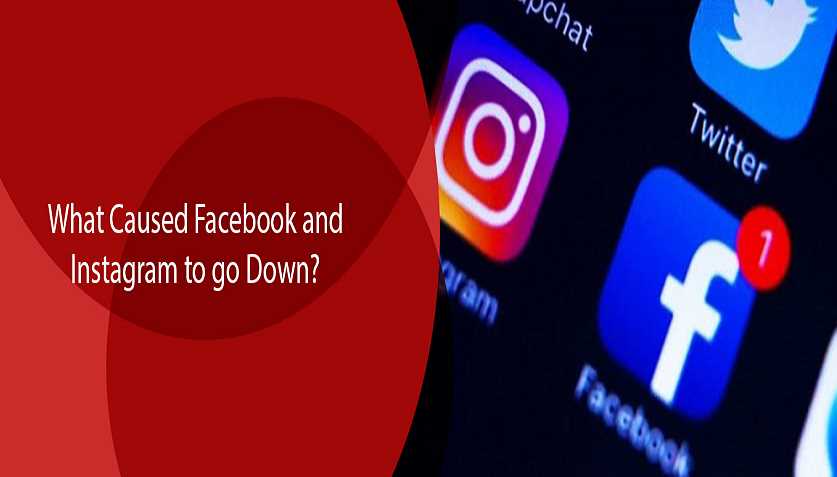Tech
What Caused Facebook and Instagram To Go Down?

Unless you have completely stopped using social media, you must have witnessed the recent simultaneous blackout of Instagram, Facebook, and Whatsapp. You would have most likely heard the explanation by the day’s end. But you must have been perplexed by the random tech jargons that were being thrown around by the media reporting the outage. This blog will help explain what exactly happened on October 4th.
The Background
Facebook is a huge organization. It has thousands of servers and other equipment that make it possible for everyone across the globe to access its website. Facebook has to create an internal network to link all its machines to the internet. Just like we have to set up a router and modem in our homes to connect to the internet. Facebook has nearly 3 billion global users. So they use a fiber optic cable that circumnavigates the globe to be able to provide service to such a huge number of users. Facebook refers to this internal network as a backbone network.
Facebook’s backbone network is not directly connected to the internet. It has to pass through two networks before it can be accessed by any external user. These two networks are Domain Name Server (DNS) and Border Gateway Protocol (BGP).
What is the Importance of BGP and DNS?
When a website goes down, it is often linked to DNS. So what exactly is DNS? It is a simple premise. If you want to access a website, a physical computer must send a signal to the computer you are using. Imagine the internet as an upgraded super-fast type of conventional mail. If a friend owns a website you wish to access, you will write them a letter requesting that website. Your friend will reply back by sending you the requested website.
However, you need to know the receiver’s address before writing a letter. Your computer also needs to know which other computer it needs to talk to before you are able to access your desired website. Initially, it doesn’t have this information. The only thing it is aware of is the name of the website you are trying to access. So then your computer connects to a DNS computer via your internet router. DNS converts domains (like google.com) into addresses. The DNS server locates websites through IP addresses. DNS computers maintain domain lists. They also have their corresponding IP addresses. Sometimes your DNS might have no idea where to look for a website. When this happens, it will communicate to another DNS that will know where to search for the requested website.
Facebook uses some internal networks to run its operations. They call it a backbone network. Facebook is a private network. So it doesn’t want other people’s DNS to know all of its own IP addresses. To solve this problem, Facebook uses its own DNS, which determines where to route access requests. This is a standard operating procedure for all medium to large tech firms.
However, DNS alone is not enough to manage operations for Facebook because of its large number of users. Facebook employs an additional protocol known as Border Gateway Protocol (BGP). Earlier, we discussed how DNS determines the addresses of computers to which you wish to connect? Once a letter is written, packed and addressed, and sent to a mailbox, you need someone to figure out how to get the letter from its origin to its destination. BGP does these logistics operations on the internet. It computes the optimum path and conveys that information to your computer when you are trying to access a website.
Most businesses do not either have enough resources to afford BGP servers or their websites generate small enough traffic to not require the use of a BGP server. Typically, only ISPs and large technology firms like Facebook or eBay use BGP servers.
So, What Exactly Happened?
While conducting a regular maintenance check, an engineer inadvertently shut down the backbone network of Facebook. All the numerous computers and servers used by Facebook were still running. However, their connection with each other had been severed.
Without access to the backbone network, Facebook’s DNS was unable to trace IP addresses back to its computers. The DNS servers simply relayed this information to the BGP servers.
The BGP computers were then forced to deny authorization to anyone wishing to access Facebook’s website. For Facebook users, all paths leading to the website were blocked and we were therefore unable to visit facebook.com.
Summing Up
Facebook, Whatsapp, and Instagram have emerged as the holy trinity of the internet over the past several years now. It must have been extremely frustrating to experience such a massive blackout of these vital platforms. We all desire to have a reliable internet connection that provides instant and secure access to every website and app in the world. Spectrum ensures you get that reliability. Their customer support is always eager to assist. You can even request support in Spanish by dialing Numero de Spectrum.

-

 Tech3 years ago
Tech3 years ago6 Tips to Improving E-Commerce Websites
-

 Home4 years ago
Home4 years agoAdvantages and Disadvantages of Village Life in Points
-

 Health4 years ago
Health4 years agoAdvantages and Disadvantages of Milk
-

 Travel4 years ago
Travel4 years agoAdvantages and Disadvantage of Travelling
-

 Sports2 years ago
Sports2 years agoThe benefits of playing an online live casino
-

 Tech4 years ago
Tech4 years agoEssay on Advantages and Disadvantages of Offline Shopping
-

 Tech4 years ago
Tech4 years ago10+ Advantages and Disadvantages of Mobile Phones in Points
-

 Tech4 years ago
Tech4 years ago8+ Advantages and Disadvantages of Motorcycle |Having Bike